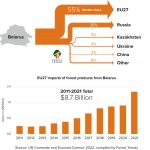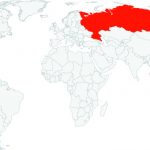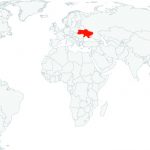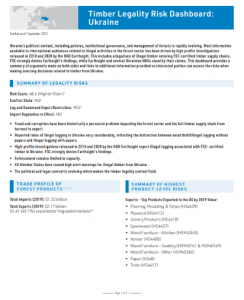
On 24 February 2022 the Russian Federation launched an invasion of Ukraine. The political situation remains extremely volatile. The timber legality dashboard was drafted prior to the current conflict.
- Fraud and corruption have been historically a pervasive problem impacting the forest sector and the full timber supply chain from harvest to export.
- Reported rates of illegal logging in Ukraine vary considerably, reflecting the distinction between wood theft/illegal logging without papers and illegal logging with papers.
- High-profile investigations released in 2018 and 2020 by the NGO Earthsight report illegal logging associated with FSC- certified timber in Ukraine. FSC strongly denies Earthsight’s findings.
- Enforcement remains limited in capacity.
- EU Member States have issued high alert warnings for illegal timber from Ukraine.
- The political and legal context is evolving which makes the timber legality context fluid.
Read more by downloading the Ukraine Timber Legality Risk Dashboard here.
In August 2023, under the guise of conducting forest fire extinguishing exercises, he involved more than 100 subordinates in the illegal felling of green plantations. The work was carried out on a land plot of 112.1 hectares located outside the village of Nova Huta.
According to the State Bureau of Investigation, this territory belongs to the objects of the nature reserve fund — the Chornyi Lis general zoological reserve.]Thus, the actions of the official could have caused losses to the state in the amount of 7 million 300 thousand UAH (approximately $197,832).
The government has extended the validity of the relevant pilot project on online issuance of logging tickets and certificates of origin of wood until June 1, 2027, the press service of the Ministry of Environmental Protection and Natural Resources of Ukraine reported.
The ministry recalled that the pilot project was introduced by the Cabinet of Ministers back in May 2023 to prevent abuse and falsification of permit documents, as well as to fully trace the circulation of wood from the place of harvesting to its sale for export.
Considered a low-risk country by the (controversial) EC EUDR risk categories, Ukraine now wants to take advantage of new opportunities to drive furniture imports into European markets with Zelenskyy authorities now working with the EU to ensure that “gray import schemes for Russian timber” are not excluded in the list of high-risk suppliers.
In 2024, FSC and Assurance Services International (ASI) launched a transaction verification (TV) loop on FSC-certified birch wood panels in China and Europe. The preliminary results from the first phase of the TV loop – data collection and analysis – reveal a number of integrity risks in certified birch wood panel supply chains. The risks will be evaluated in the next stages of the investigation. The TV loop captured 3,436 transactions that took place in 2023, as reported by 665 certificate holders with physical possession of certified material from 18 countries in the Eurasian region. They are Bosnia and Herzegovina, Bulgaria, China (including Hong Kong), Latvia, Romania, Slovakia, Croatia, the Czech Republic, Estonia, Georgia, Greece, Hungary, Lithuania, Moldova, Poland, Slovenia, Serbia, and Ukraine.
Some of the key findings and the integrity risks they pose to certified birch wood panel supply chains are:
- Around 74 % of the certificate holders reported zero transactions (no purchases or sales) of birch products, many of which were from China. This is indicative of a potential risk because there are multiple stakeholder reports alleging a large supply of birch products originating in China.
- Concerning cases of potential volume mismatch: some certificate holders reported purchases while their suppliers reported zero sales. Additionally, some certificate holders declared the purchase or sale of specific (‘zero transaction’) Betula species that were not within the suppliers’ certificate scope or geographic region.
- A large volume of birch logs purchased from Ukrainian forests may potentially originate from the conflict area. In light of the current suspension of the FSC certificates in specified conflict zones, the reported volume of domestic purchases from Ukrainian forest management units and the volume of wood panels exported from Ukraine are a cause for concern.
- None of the certificate holders participating in this TV loop declared any purchase or sale of birch from Russia within the scope of their FSC certification. However, potential mismatches between the volume of wood purchased and sold through the supply chain may be a result of non-certified wood (including that from Russia) entering the certified supply chains.
Nearly half of all sampled birch products—used in furniture, kitchen panels, and musical instruments—certified by FSC or PEFC have been misidentified and do not come from the correct country of origin. 44% of the evaluations showed that documentary claims relating to wood fiber species or harvest location were incorrect. 46% of certified products had claims that were incorrect.
High percentages of incorrect claims were found for wood fiber from products with harvest location claims in Ukraine, Poland, Estonia, and Latvia, all of which border sanctioned birch production areas.
A study on the most common corruption risks in Ukraine’s forest sector was presented by the National Agency for Corruption Prevention, WWF-Ukraine, the Specialized Environmental Prosecutor’s Office of the Prosecutor General’s Office, and the Basel Institute on Governance.
Key findings from the report by state and civil society institutions include:
- Low transparency in timber sales, hindering reforms in forest management.
- Excessive discretion and inadequate external oversight create corruption opportunities.
- Current reforms have not addressed conflicts of interest within forest sector institutions.
- Formality in administrative processes enables corruption.
- Wartime restrictions on oversight and inspections have weakened existing control mechanisms.
- Large-scale sanitary logging creates opportunities for abuse.
The State Ecological Inspectorate of the Carpathian District found illegal felling of trees on the territory of the Kosmak Forestry of the Kutske Forestry branch and issued a claim for more than UAH 83 million to the forestry. In response, the State Enterprise “Forests of Ukraine” publicly accused the environmental inspectors of bias in the results of this inspection.
The Ukrainian Nature Protection Group (UPG) claims that with the tacit consent of forestry officials, hundreds of ancient trees are being illegally felled in Polissia and the Carpathians. UPG believes that such a felling could not have taken place without the knowledge of the branch management.
Up to 40% of all softwood entering the EU comes from Ukraine, according to new data published by Eurostat—the European Union’s statistics bureau—which reports that Ukraine, Norway (32%, or 409,000 cubic metres), and Bosnia and Herzegovina (10.5%, or 133,000 cubic metres) are Europe’s new big three in the wake sanctions imposed on Russia, which together with Switzerland and Canada make up the vast majority of the 1.262 million cubic metres trade into the block.
The Zelenskyy administration new policies will ramp up timber processing in the controlled (west). WWF-Ukraine Director warns that the new policy risks making Ukraine a “high-risk” country as defined under the EUDR’s terms and definitions.
Since Russia’s invasion, the value of the Ukrainian forest economy has drastically increased relative to all other industries. As a result, Ukraine is now ramping up timber cutting to supply the EU with energy, front-line military fortifications, wooden pallets, and furniture.
According to Eurostat, the EU’s office for statistics, Ukraine is the zones third most important market for timber furniture (10.1% of total imports), behind only China (47%) and Turkey (10.2%) but ahead of Vietnam (5.1%).
State auditors in Ukraine found the State Specialized Enterprise “Pivnichna Pushcha”, which is managed by the State Agency of Ukraine on Exclusion Zone Management (SAUEZM), revealed a number of serious violations.
In particular, an area of 29.4 hectares of the SSP “Northern Forest” continuous “sanitary felling” was carried out in violation of the law – without the use of the environmental impact assessment (EIA) procedure.
Ukraine is cracking down on the surge of “gray wood” – where timber is illegally felled and sold via crime syndicates – from entering global markets, vowing to develop a “European model” for monitoring in the lead-up to the European Union Deforestation Regulation (EUDR).
The Zelenskyy government announced the new decree on Thursday, June 13. For the first time, the decree requires that all forest users take photos of timber during felling, haulage, and the value chain. According to Ruslan Strilets, the Ukrainian Minister for Environmental Protection and Natural Resources, the new block-chain-like timber accounting system will track wood felled from the forest, from haulage to processing and distribution.
Also reported here: Ukraine introduces mandatory photo documentation of timber – government decision (ukrinform.net)
Employees of the State Bureau of Investigation completed pre-trial investigation and submitted to the court the case against an organized group of 9 people, which only for 5 months of illegal activity cut down about 1 thousand trees in Kirovohrad region. By their actions “black loggers” caused damage to the state for more than 4 million UAH.
Russian armed forces have targeted forests in and around the Kharkiv region to export timber and sell into Eurasian markets.
Ukraine’s biggest state enterprise, Forests of Ukraine, is scaling up lumber and raw log production to build new roads and enormous fortifications along Ukraine’s front line.
The government of Ukraine, supported by Germany, plans to boost the production and exports of PEFC and FSC-certified timber in the western parts of the country, largely unimpacted by the war. It comes as the government announced in January plans to scale up timber production, build new forest roads, and stamp out corruption to make the industry more competitive in global markets. With Russia’s FSC certifications canceled, demand for certified timber in European markets is likely to be strong.
The TV loop aims to identify and take action against instances of false claims or other violations of FSC requirements.
The scope of this Eurasia birch wood panels TV loop is:
- Geographic areas: China and central and eastern European countries (Bosnia and Herzegovina, Bulgaria, Croatia, Czech Republic, Estonia, Georgia, Greece, Hungary, Latvia, Lithuania, Moldova, Poland, Romania, Serbia, Slovakia, Slovenia, and Ukraine).
- Product type: Plywood
- Species: Birch (Betula)
Almost 30% of Ukraine’s total forest area has been destroyed by conflict, with Russian armed forces logging Ukrainian forests and selling timber into global markets via “friendly countries.”
Ukrainian crime syndicates are falsifying documents and selling deforested timber from within the Chornobyl exclusion zone, with syndicates converting the proceeds of crime into foreign currency, and using conflict and illegal logging to fuel an extensive criminal network.
Also reported on here: Smuggling of timber worth millions of hryvnias: five accomplices of an organized group are suspected | УНН (unn.ua)
Poland is the new gateway for Belarussian timber, with the import of timbers (via Kazakhstan) surging. A joint investigation involving the Belarussian Investigative Center, Radio Free Europe, and Polish newspaper Gazeta Wyborcza alleges that Polish imports of timber from the largely deforested Kazakhastan grew from €14 million (pre-war) to more than €68 million last year as part of a €126 million global trade in conflict timber.
Also featured in Belarus evading EU sanctions by importing timber to Poland with false documents, finds investigation | Notes From Poland and Fraud Exposed: Poland Now EU’s Ground Zero for Conflict Timber | Wood Central
Scientists are using state-of-the-art tech to correctly trace the flow of timbers entering the EU from Russia and Belarus and have developed a new framework that policymakers can use to eliminate conflict timber worldwide.
Developing the world’s largest reference database for Eastern European timber species (Betula, Fagus, Pinus, Quercus) tailored to sanctioned products; scientists can correctly predict, with 82% accuracy, “false claims” coming from Russia as well as harvest locations “within 180 to 230 km of the actual location.”
When Russia invaded Ukraine in February 2022, sanctions swiftly followed, including a total ban on Russian timber imports into the European Union (EU) from July 2022. Belgium, one of the staunched supports of the EU ban, has become a profitable destination for Russian wood. Using a forensic laboratory at the Royal Museum for Central Africa in Tervuren, inspectors determined that several wood shipments from Russia had arrived in Belgium. The number of fines imposed for illegal harvests almost tripled in 2023.
“But an impediment is a distinct lack of inspectors,” Wynant said. “There are now fewer than five timber inspectors working full-time in Belgium, but there are 4500 timber importers,”according to the article .
The Ukrainian Embassy Malaysia reported on the ecological damage to Ukrainian forests. One-third of the countries forests are damaged, and illegal logging is rampant in national parks and reserves in areas occupied by Russian forces.
Russia and Belarus are ramping up timber exports to Uzbekistan amid fears the former soviet state could act as a new trading post for conflict timber entering global timber supply chains.
It comes as Uzbekistan is spending billions on new rail, road and sea infrastructure, funded by China’s Belt and Road Initiative, forging new pathways for timber to infiltrate global supply chains.
Already, Uzbekistan is Russia’s second-largest importer of softwoods, with 480,000 cubic metres of timber (or 11% of its total imports) imported into the country every quarter – in what is a significant escalation in trade since the start of the Russian invasion of Ukraine.
It comes as Wood Central reported in July that a block of ten countries – including Uzbekistan as well as China, Kazakhstan, Belarus, Iran, Kyrgyzstan, the United Arab Emirates, Azerbaijan, and Tajikistan – is fueling a booming trade of conflict timber bypassing western sanctions.
Since Russia invaded Ukraine, the country’s relationship with China took on even greater significance. More than 83% of Russia’s timber export goes through Chinese supply chains, with China now Russia’s distribution point to global forest markets.
Chinese shipping companies like the Shandong Port Group play a crucial role in Russia realising its Arctic transport aspirations. The company includes four major seaports in the Chinese Shandong region and are looking for more.
Komi Governor Vladimir Uiba – who has strong ties to the failed Wagner group – is pushing to attract Chinese investment in forest processing. Komi is Russia’s second-largest state and is home to the Virgin Komi Forests – a UNESCO World Heritage Site and the largest virgin forest in Europe.
The European Commission is investigating potential illegal imports of Russian birch plywood products into the European Union. CELEX:32023R1649:EN:TXT.pdf (europa.eu) There has been a significant increase in imports of Russian birch plywood into Turkey and possibly Kazakhstan, and an increase in exports of birch plywood from both countries to the EU—although neither has been a significant producer of birch plywood in the past. The EU banned Russian wood after Russia invaded Ukraine.
ICIJ partners in Europe revealed the indirect trade routes used to mask the origins of Russian timber, which continues to flow into the EU despite being banned.
Paper Trail Media, Der Spiegel, ZDF and others analyzed trade data to trace the pathway of banned wood through third countries, including China, Turkey, Kazakhstan and Kyrgyzstan.
Before Russia’s invasion of Ukraine in February 2022, about 80% of all birch plywood globally was produced in Russia, Belarus and Ukraine.
After the fifth package of sanctions imposed on Russia by the EU finally entered into force in July 2022, the import of roundwood and wood products, including birch plywood, from Russia to the EU was banned. However, according to information and statistics obtained from the market, it seems that illegal Russian birch plywood continues to be imported to Europe from third countries.
This is reflected in increased imports of birch plywood from countries such as Kazakhstan and Turkey. Considering the production capacity of Kazakhstan, we can see that the country does not have sufficient birch plywood production to be able to deliver the volumes recorded in the statistics.
Illegal birch plywood travels to the European markets in many ways. The import ban is evaded by transit through a third country, for example. The third countries may also make minor changes to the plywood, after which the country where the changes were made is reported as the products’ country of origin. Another way is to use a false tariff heading so that the product is excluded from sanctions.
Russia has been accused of engaging in industrial-scale logging in Ukraine, cutting down large swaths of trees for sale and to strengthen its defensive positions. In a letter to President Putin, Russian Defense Minister Shoigu requested permission to harvest timber and stated that “wood not used for defense will be sold to finance the military operation.”
Forty-three organizers of illegal logging schemes, including high-ranking officials of state forestry enterprises, have been convicted in Ukraine since the beginning of this year, Ukraine’s SBU State Security Service has told Ukrinform.
A group of companies found to have illegally logged as many as 4mn trees in Siberian forests supplied furniture giant Ikea with wood for years, with a product likely to have contained the illegally sourced Russian wood sold every two minutes, according to the results of an investigation by environmental NGO Earthsight released in July.
Sanctions breakdown as Belarussian timber exports surge 8-fold for the first three months of 2024.
Timber exports from the heavily sanctioned Putin-aligned state have exploded over the past 12 months, with more than 365,000 cubic metres of sawn wood traded into 15 “friendly nations” in the first three months of 2024 alone.
That is according to the government-backed Belarusian Universal Commodity Exchange (BUCE), which reported that Belarus timber production was up eight times over the January to March quarter for 2023, with the total output of Belarussian timber reaching 748,000 cubic metres— including 49% traded into global markets via third-party Eurasian trading ports.
Click here to access the Global Illegal Logging and Associated Trade (ILAT) Risk assessment tool and to download the Forest Trends User Guide describing the functionality of the ILAT Risk Data Tool.
Click here to access the Cattle Data Tool.





















